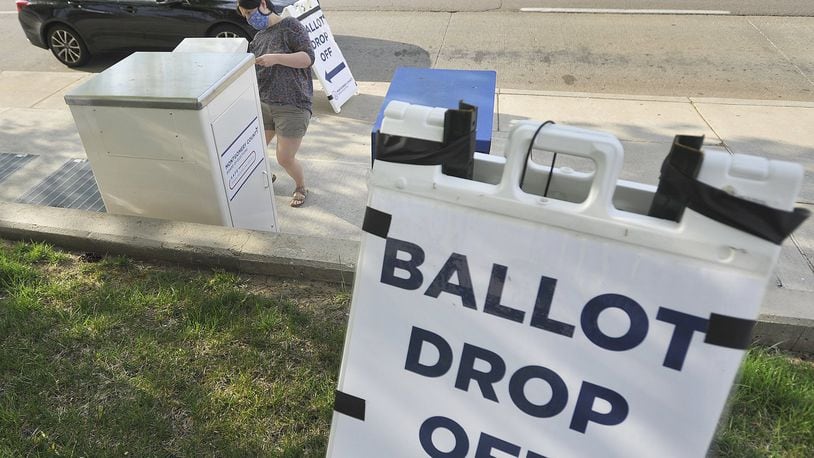YOUR VOICE OHIO: How you can shape 2020 presidential election coverage
Some elections boards are conducting surveys of poll workers to find out if they remain willing to work if the virus continues to circulate. Elections boards and the Secretary of State’s office are also stepping up recruitment efforts to replace those who don’t return.
Terry Burton, Wood County’s elections director and a guest speaker, told task force members the county surveyed workers to determine now if they will still serve if the pandemic worsens.
“We’re trying to make sure that we figure out right up front what sort of numbers we’re looking at,” he said.
Of the first 231 replies to the survey, 18% said they won’t be returning, primarily due to health concerns, Burton said.
Burton said the survey also asked poll workers to suggest what steps would make them comfortable working the polls and what type of personal protective gear they want provided.
“It’s going to be a different situation in October,” he said. “Hopefully, it’ll be better, but it could worse.”
LaRose convened the five-member Ready for November Task Force last month to prepare for the Nov. 3 presidential election while in the midst of an evolving health crisis. The state struggled through a chaotic March primary stalled by the pandemic and completed in April largely through mail-in ballots.
MORE: Ohio’s primary election draws turnout below 23 percent
Warren County is also conducting a survey of poll workers, said Brian Sleeth, the county’s elections director and a task force member.
Warren County sent the online survey to about 850 poll workers. Sleeth said he expects some results within a week.
“We told them we needed a 100% commitment,” he said. “There was a ‘maybe’ button, but we need either a ‘yes’ or ‘no,’ so we can plan accordingly.”
Another question asked if the workers had the technology available to attend virtual meetings.
New elections officials will initially still be trained in person and those with experience will likely train online, Sleeth said.
“We usually train them all in person and that’s not possible with social distancing,” he said.
Montgomery County has historically had little difficulty in finding elections workers — that is until this past March, said Steve Harsman, Montgomery County Board of Elections deputy director.
“We were losing poll workers at a pretty high rate,” he said. “So yeah, we’re very concerned with recruitment and poll workers going into the November cycle with what’s going on in society with this pandemic and coronavirus.”
Montgomery County typically needs up to 1,500 poll workers for a full election and has a database of 1,800-1,900 to draw from, Harsman said.
MORE: Five states vote only by mail. Should Ohio do the same to avoid coronavirus?
In years past, the average poll worker age trended between 70 and 75. The average age is now closer to 60, Harsman said.
“But still, 60 is in the high-risk group,” he said. “So that’s very concerning to us as well … For the limited amount of money that we’re paying for a 14-hour day, a lot of people are going to second guess themselves.”
Montgomery County hasn’t conducted a formal survey, Harsman said, but sent letters to poll workers asking for feedback and to respond if they don’t plan to work the coming election.
Harsman questioned how valid survey responses might be this far from the election.
“The data that they receive on those may change. If a vaccine is found in a month, people may be more willing to work,” he said. “If the (COVID-19 case) numbers continue to grow nationally, that survey today means nothing because I think more and more people won’t work.”
Boards of elections will also spend more time and resources keeping poll workers safe with protective equipment and making sure polling locations are sanitized for both elections officials and voters.
MORE: Coronavirus: Next 100 days: ‘We’re going to have to live with this’
Sleeth said this year each polling location will require a new position — a sanitizer.
Montgomery County has 152 polling locations typically, but in the last primary that went down to 142 when facilities including nursing homes became off limits.
Task force members also heard Thursday from Gabriel Summe, the top elections official in Kenton County, Ky., about her recent experience setting up a single county polling location in a convention center where more than 4,000 cast ballots in last month’s primary.
How to direct that many voters from outside to 32 tables indoors and keep everyone socially distanced and the facility and equipment sanitized had to be planned quickly, she said.
“It seemed to work very well,” she said. “People told me it took 10 minutes from parking, coming in, getting their ballots, to getting back to their cars, which is shorter than it is on a regular day with any of my other precincts.”
The same factors, as well as a mask ordinances popping up in some jurisdictions and perhaps other new rules will confront Ohio elections officials in November, Harsman said.
“There are all kinds of different issues that we’re tracking now, but until we know what the rules are, it’s kind of hard to react to them,” Harsman said. “Election officials across the state and probably across the country are kind of in limbo. So, you know, we’re coming up with contingency plans — a lot of what ifs — but until we know the rules, it’s really kind of hard to go forward with anything.”
LaRose said Ohioans can visit www.ohiosos.gov/defenddemocracy to sign up to become an elections official.
About the Author
